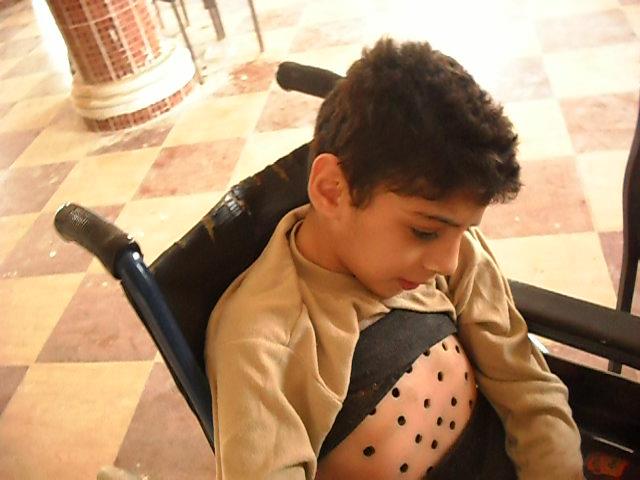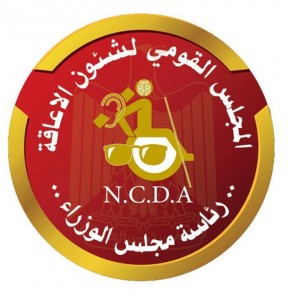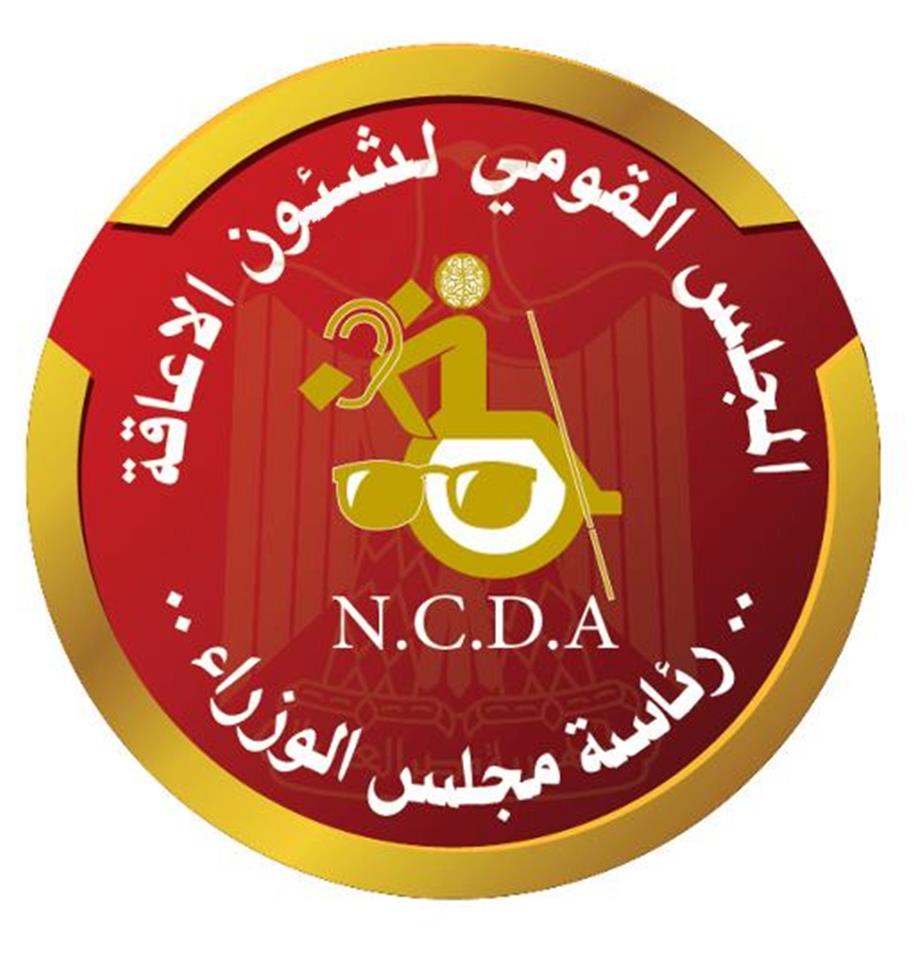
Courtesy of the Child’s Dream Centre
Egypt is not a country best-suited to those with disabilities. For years, Non-governmental associations such as Dar El-Orman and Resala have been trying to support people with physical and mental disabilities, and disabled people have sought to establish a specialised-governmental body to address disability issues.
Following the January 2011 uprising Mohamed, who has limited use of his legs, started an online initiative along with other disabled people, to increase public awareness regarding the issue of disabilities in an attempt to improve the lives of those living with disability. They started hosting conferences across the country and lobbied Prime Minister Kamal El-Ganzouri, along with several state authorities. The then prime minister established the National Council on Disability Affairs in June.
Given the presence of laws, associations and programmes to support disabled people, why did people want to have a governmental institution specialised in disability affairs?
Humiliated by having to ask for help, people like Mohamed wished their environment could be adapted to their needs rather than framing their disabilities. Inaccessible sidewalks are just one frustrating aspect of city life. Without ramps aids public transportation is not accessible for people with physical disabilities. Abdel Aziz faces challenges relying on public transportation. “I have to take public transport to get to work,” he said, “and people have to carry me,” given the lack of wheelchair access.
The alternative to public transport for those with mobility issues is a modified car. To acquire such a vehicle, people are required to seek governmental approval at a public hospital. The approval is an official permission to purchase the car, and is not monetary support. The doctors at Mounira Public Hospital, in El-Sayeda Zeinab, officially validate the physical disabilities of the applicant. Mohamed sought an approval at the hospital but his application was denied three times.
When Abdel Aziz sought the certificate he was denied on grounds he was not fit to drive, but that was not his only frustration. “The medical examination fees are EGP 500,” he said, “if my health condition is not fit for driving, why take these fees from me at the beginning? I’m a person with a physical disability, if I do not get to drive a modified car then who should?”
Abdel Aziz’s concern is that the medical examination should evaluate the type of modifications to be applied to a car, rather than telling the patient that they cannot hope to drive.
Abdel Aziz’s brother is an amputee and has owned a modified car for five years. Abdel Aziz tried his brother’s car and found he could drive it. He believes that as long as he can drive his brother’s car then he is fit to drive any modified car. “And even suppose that I’m fully paralysed, what are the provisions then?” he asked.
Obstacles facing disabled people visiting Mounira Hospital are not limited to obtaining validation. “The place itself is not fit for disabled people,” said Mohamed, referring to the absence of an access ramp. “The environment hinders people rather than helps them.”
The distance between El-Tebeen, where Abdel Aziz lives, and the hospital is around 30 km. The cost of transportation is just one financial burden. Between service costs of his EGP 7,000 electric-wheelchair and his family expenses, Abdel Aziz struggles to maintain two jobs in an attempt to cover expenses. He works as an auditor in the National Authority for Insurance and Pensions by day, while running a small shop in his neighbourhood at night. Abdel Aziz counts himself lucky to even have a job, as the employment market is rife with discrimination against the physically disabled.
Despite national employment laws, lack of employment opportunities is a substantial issue of concern. Like many disabled people, Mohamed had difficulties just getting an interview. “I applied for several jobs in the public sector but they disregarded my application without providing me with any reasons,” he said. As a university graduate, Mohamed felt certain he was academically qualified for the jobs.
The Rehabilitation of Disabled Persons law of 1975, amended in 1982, is intended to protect the rights of disabled people. The law sets an employment quota for disabled people at five per cent, in all public and private sector companies with more than 50 employees. Companies violating the law face penalties, including a paltry EGP 100 fine. Since its establishment in June, the NCDA has been lobbying all sectors to abide by the law.
The independent governmental council has proposed a draft law that raises the quota to seven per cent on companies with more than 25 employees. “The council presented the draft law to the dissolved parliament and will present it again to the new parliament when formed,” said Mohamed Mokhtar at the NCDA. The draft law increases penalty to EGP 1,500 fine along with a three-month prison sentence. Conducting conferences and workshops across governorates, the council continues to collect recommendations and proposals to be added to the draft law to ensure the livelihood of disabled people; including insurance and education.

Hassan Ibrahim
One of the entities that help disabled people overcome employment difficulties is the Dar El-Orman association. Established in 1993, El-Orman also provides disabled people, as well as families taking care of disabled people, with income-generating projects. “Development is the umbrella under which the association works,” said Mohammed Fareed, media official at El-Orman. Providing them with a kiosk, a buffalo or a sewing machine, the association seeks to make people generate their income rather than just giving them money. “We want people to be productive,” said Fareed.
The NCDA also assists people seeking small-scale projects, by evaluating their needs and referring them to associations such as El-Orman. Currently, the council is initiating a protocol with the Social Fund for Development to provide disabled people with microloans to enable them to start their own small-scale project.
In addition to cooperating with associations, the NCDA has initiated several protocols with governmental and non-governmental bodies. In a protocol with the Ministry of Communications and Information Technology, an NCDA project aims to collect the statistical information regarding disability in Egypt. The World Health Organisation (WHO) confirmed that their figure of 12,000,000 disabled people in Egypt is just an estimation.
WHO is planning to conduct a survey in cooperation with the NCDA, to produce more precise numbers. Facilitating data collection is a software program designed by the Ministry of Administrative Development. Identifying geographical locations, the council will recognise the services needed in every area. “The project will provide disabled people with smart ID cards,” said Mokhtar, which will facilitate their access to services.
The council also initiated a protocol with the Ministry of Health. “Each protocol provides new services to disabled people,” said Mokhtar. The Ministry of Health protocol, implemented on 10 November, offers health insurance to children below the age of six along with children withdrawn from schools, and raises the insurance coverage on cochlear implants operations from EGP 60,000 to EGP 100,000.
The NCDA’s cooperation with local associations supports disabled people seeking medical care. For instance, people in need of prosthetic devices are referred to the associations providing such free-of-charge services; NCDA has been referring cases to El-Orman for the past two months.
El-Orman has a significant role in providing free-of-charge medical services for disabled people. Addressing vision impairment, the association covered surgical expenses so people could gain sight. “We spent more than EGP 20 million during the past two years to restore the sight of [approximately] 9,000 people and the medical examinations of more than 52,000,” said Mustafa Zamzam, director of El-Orman’s media centre. Not all of the patients had severe visual impairment; most of them had vision complications that were treated through medication or other measures not necessarily surgical, such as providing them with spectacles.
Medical support is not the only service provided by El-Orman, where the association’s services include rehabilitation, support and empowering disabled people. A matter of concern is whether local associations cover all those in need of support or not. “It is hard to precisely state the number of people received at the association, but we have received over 400,000 disability conditions since our establishment,” said Zamzam.
The NCDA project to identify disabled people and their geographical area is significant because there are people living in rural areas who cannot access support services. Living below the poverty line, some parents from Kafr Hakim (a rural village in Kerdasa district) cannot afford the transportation expenses to reach the associations or organisations that could help them. “There are mothers who cannot afford two pounds for transportation,” said Kamel Hamam, director of Child’s Dream Centre, which provides rehabilitation services for disabled children.
Lack of financial support does not only affect those in rural areas, but associations in the urban areas as well. “We cannot receive more than 200 disabled people because we do not have enough space,” said Osama Ismail, responsible for the Resala’s disability programme at the Maadi branch in Cairo. Resala is not affected by financial issues as an association, but its disability programme faces money problems. Out of the people donating to Resala, only a few donate to the disability programme.
Resala does not guide charitable people into which programme they should donate. “People come and donate either to orphans or poor people programmes and do not consider that people with mental disabilities need help as well,” said Ismail.
The NCDA will be initiating several awareness campaigns starting January. Community-Based Rehabilitation aims to enhance social integration and equality for disabled people. The council will start a campaign that addresses the factors associated with the causes of disabilities, and will present a set of preventive measures to be taken by the parents and the authorities.
***
Causes of disabilities (specialists refer to them, scientifically, as factors increasing the risk of a person being associated with a disability) are widespread. Dr Ehab Ragaa, professor in clinical and neurogenetics, clarified the causes under three models, which are genetic, environmental and a combined model. Ragaa said that intermarriage among relatives represents the major factor behind the genetic causes; recessive inheritance. The problem is that parents may not exhibit any symptoms or visual disabilities, however their children could.
“The trinity of poverty, illiteracy and diseases,” said Ragaa, is the widespread factor behind the rising numbers of disabilities under the environmental model. The aspects are interrelated and not only does it affect the rising numbers, but it restricts rehabilitation and preventive measures.

The medical unit in Kafr Hakim demonstrates the inefficiency of health care in rural areas. “Lack of medical equipment during delivery,” said Hamam, make children susceptible to acquiring disabilities. Lacking incubators, a newborn child does not receive the necessary health care. Villagers who understand the risk associated with an inadequate medical care unit seek private hospitals instead. But those who cannot afford a private hospital risk their health and that of their babies as well.
Ragaa said, “the unsafe practices followed during pregnancy and birth cause the greatest problem in Egypt, cerebral palsy.” Representative of several rural areas, the unhygienic delivery practices in Kafr Hakim are a factor leading to severe complications to the child’s health. “Usually it is not a doctor that delivers the babies,” said Hamam.
With improper practices just before or during delivery, a child could suffocate leading to severe complications. Cerebral palsy, one of the widespread disabilities in rural areas, usually results from lack of oxygen reaching the brain and causes atrophy of brain cells, which can result in mental or physical disability, depending on the type of brain cells damaged.
“There are children who were born healthy and maybe one day get a fever for example,” Hamam added, “a mother goes to a doctor who gives her child the wrong medication.” He said that as result of the wrong medication, Ahmed Ragab El-Sayed ended up with quadriplegia and cerebral palsy.
The environmental model also includes accidents, malnutrition and pollutants as risk factors of acquired disabilities. Air pollution has long been an issue of concern due to its drastic effects on health.
While environmental pollutants include lead, arsenic, mercury and aluminium, agricultural practices concern researchers. Chlorpyrifos residues in fruits and vegetables, a widely used pesticide, causes health defects like cancer and neurological complications. Being neurotoxins, pesticides have a short and a long-term effect on humans. Short-term effects include a reduction in concentration and coordination abilities, whereas long-term exposure is associated with permanent brain atrophy.
Pesticides are not the only harmful factor in agricultural, especially in rural areas. “The agricultural lands of Kafr Hakim and more than one village neighbouring us, is exposed to industrial sewage,” Hamam added “which carries adverse effects on human health.”
The interaction between genetic susceptibility and environmental factors is a potential cause of, for instance, autism as external factors trigger the expression of a genetic disorder inherited in the child. Ragaa said, “early exposure to television for prolonged periods causes changes in the neural networks.” He added that genetic disorder susceptibility and chronic malnutrition increases the risk of the child being born with a neural defects. For instance, a genetic predisposition along with a deficiency of folic acid in the blood levels, increases the risk of acquired disabilities.
Early determination of symptoms leads to the early intervention and prevention of complications. Parents should be highly aware of health-care measures, approach genetic counselling and conduct examinations prior to marriage. But such preventive measures are hindered due to lack of literacy in parents and inadequate doctors.
In denial, some parents seek comfort from someone who will tell them that their child is healthy. Ragaa’s voice was filled with outrage when he said, “they keep searching for ignorant doctors, who tell them not to worry, their child is just too lazy to walk and play.”
***
The NCDA has endured obstacles since its establishment. Mokhtar said he believes that the government should adopt new mechanisms that cope with the council’s ideology. “Currently the government still follows the old routine approach,” Mokhtar added, “routine and slow-paced procedures are the reasons for delaying everything.”
The travails that disabled people undergo pushed them to protest last month in front of the presidential palace, calling for their rights and the implementation of the law. Though the protestors had a permit for the peaceful sit-in, police officers attacked the disabled people.
The illegal measures carried out by the police did not affect the resolve of the protest; the disabled protestors remained in their sit-in for more than two weeks. In addition to proposing laws, Mokhtar said, “the council calls for the implementation of the international conventions protecting the rights of disabled people,” referring to the UN Convention on the Rights of Persons with Disabilities which was signed by Egypt in April 2007 and ratified in April 2008.
Several initiatives and associations have been trying to help disabled people, and the formation of the national council is one important step along the road. In addition to the NCDA’s establishment, on 22 October, President Morsy met with representatives of disabled people and their associations.
They discussed the problems faced by disabled people along with the concerns regarding the issue, and the people were promised a set of changes. “Promises included providing promotions to disabled people who are employed in the public sector, removing customs on modified cars, exemption from taxes and facilitating the process of owning a residence,” said Mohamed, but no time scale was given.



